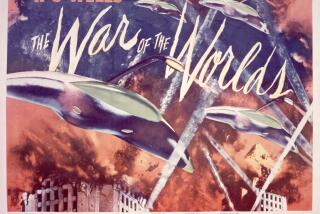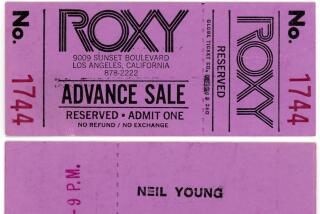65 years later, invasion continues
Fiendish pranks by mischievous youths are to be expected on Devilâs Night, Halloween Eve. But 65 years ago today, the nation awoke with a hangover from the massive practical joke orchestrated the night before by one brilliant 23-year-old.
As Orson Welles said at the end of his classic âWar of the Worldsâ broadcast on Oct. 30, 1938, âWe annihilated the world before your very ears, and utterly destroyed CBS. Youâll be relieved, I hope, to learn we didnât mean it, and that both institutions are still open for business.â
What started as an adaptation of the classic science-fiction novel by H.G. Wells ended as perhaps the most famous radio broadcast in history. The story of a Martian invasion at Groverâs Mill, N.J., which spurred panic among thousands who believed it was real, dramatized the potential of the relatively new medium -- both as innovative entertainer and powerful persuader.
âItâs amazing how many people know about it, even though itâs been 65 years since it happened,â said Alex Lubertozzi, co-editor of âThe Complete War of the Worldsâ (Sourcebooks, 2001), which examines the broadcast and its aftermath. âMost people have never even heard it, but they know about it.â
Continuing a three-decade tradition, KNX-AM (1070) will air the broadcast tonight at 9 as part of its nightly âKNX Drama Hour.â
In planning for the original broadcast, Welles and his Mercury Theatre on the Air wanted to use radio to its fullest, assimilating the sounds and style of breaking news coverage to their entertainment offering.
âHe used that technique, and I think it really took people off-guard,â as such a manipulation had never been done before, Lubertozzi said. âOrson Welles, he made it seem realistic and used the technology as best he could.â
For example, the actor who played the on-the-scene reporter, Frank Readick, studied the broadcast from the previous year of the Hindenburg airship disaster, to give his own description of the Martian attack urgency and verisimilitude. Welles thought some people might be fooled but didnât expect the widespread panic that ensued.
The Mercury Theatre on the Air had been on the air only three months, and its presentations of literary classics such as âTreasure Isandâ and âA Tale of Two Citiesâ were continually drubbed in the ratings by the troupeâs competitors on NBC, ventriloquist Edger Bergen and his dapper dummy Charlie McCarthy.
That show owned about 35% of the national audience, compared to 4% for the Mercury Theatre, according to the ratings. But on that particular Sunday night, after Bergen and McCarthy finished their preliminary jokes and crooner Nelson Eddy launched into song, an estimated 4 million listeners began channel surfing and landed on the CBS broadcast -- what sounded like a reporter doing a live remote at the scene of a strange meteor crash. These folks had tuned in too late to hear Wellesâ introduction of âThe War of the Worlds,â and by the first station break, 40 minutes into the hourlong broadcast, many had fled in terror and missed the reiteration that the show was merely a radio play.
Of the programâs nationwide audience of 6 million people, about 1.2 million panicked, believing the invasion was true, according to a study published in 1940 by Princeton University professor Hadley Cantril.
âThey had no reason to suspect it wasnât real,â Lubertozzi said. âThey sort of just believed it: âCBS wouldnât report this if it really wasnât happening.â â
So listeners, particularly in the New Jersey and New York area, ran into the streets and jammed police switchboards, asking for evacuation advice or insisting they could see the blanket of poison gas being unleashed. Others gathered in churches to pray and await the end of the world. Callers outside the affected area asked local authorities for casualty lists, to find out if their loved ones were among the dead. And thousands more around the country wondered when the invasion force would reach them.
Itâs easy, with 21st century hindsight, to dismiss the fear that Welles wrought as the hysterical reaction of rubes and dolts. Even people at the time ridiculed the panic-stricken. But the terror was genuine among those who believed the broadcast, and it was fueled by both current events and the quality of the performance.
Even now, 65 years after the Mercury players first sent their words and sounds out over the airwaves, the screeching of the Martian heat ray as it immolated the crowd around the spaceship, the shrieks of the victims, the horror in the commentatorâs voice, and the sudden dead air of his silenced microphone, can still elicit chills.
âThey heard it, and they got scared,â Lubertozzi said. âIt seemed real to them.â
More than a few people at the time believed life could exist on Mars, a theory popularized by distinguished American astronomer Percival Lowell, who helped discover Pluto and, who in 1908, wrote âMars as the Abode of Life.â
Inventors and radio pioneers Nikola Tesla and Guglielmo Marconi each claimed to have intercepted transmissions they believed came from the red planet. And in 1922 and again in 1924, during periods when Mars passed relatively close to the Earth, the U.S. government suspended its own radio broadcasts to listen for extraterrestrial signals.
âYou have to think what it was like back then. Everybody was uptight about a lot of things,â said Kay Reed, retired tax collector for New Jerseyâs West Windsor Township -- the community that includes Groverâs Mill -- and an unofficial historian of the broadcast and the phenomenon it created.
âWar of the Worldsâ aired after a monthlong war scare, in which continual radio reports from Munich kept Americans on edge, wondering whether theyâd be drawn into the conflict between Hitler and the European leaders opposing his takeover of Czechoslovakia. Listeners had grown used to hearing their programs interrupted by bulletins, so the news flashes during the Welles broadcast bore the ring of truth.
The day after the broadcast, an irate Sen. Clyde L. Herring (D-Iowa) said the program and its aftermath were proof that radio needed âcontrol by the governmentâ and promised to introduce a bill letting the Federal Communications Commission screen and veto any program before it aired, according to a study of radio hoaxes by Justin Levine in the Federal Communications Law Journal. Herring never introduced the bill, however, and most newspaper editorials at the time decried such a heavy-handed approach, instead advocating self-restraint by the broadcasters themselves. The New York Daily News, for example, criticized Herringâs opportunism and said, âWe hope the next Congress ... will smack flat all radio censorship bills with the avalanche of âNOsâ they deserve in a free-speech, free-press, free-religion, free-assemblage country.â
âMost people looked at it as a great practical joke,â Lubertozzi said. âNobody actually got killed, nobody died. There was a big furor at first, but it died down.
âIn some ways, it was the end of innocence with the media. People are much more skeptical about what they see and hear. I think we did learn a lesson: You need to pay attention to what youâre hearing and not take it at face value.â
Reed said her own father-in-law merely looked out the back window to see if the invasion was real. Convinced when he saw no mayhem, he went back inside. But she said other residents of the Groverâs Mill area âbecame very embarrassed about being taken in.â
The embarrassment seems to have eased over the years, though, as the community has erected a commemorative plaque at the âinvasion siteâ and hosted anniversary celebrations. Saturday night, the David Sarnoff Library near Groverâs Mill is hosting a stage version of the radio play and a costume contest, both to commemorate the broadcast and to create a museum exhibit about the event, at the library devoted to the broadcast pioneer and former RCA chairman.
âThis history needs to be preserved somewhere,â Reed said. âItâs a neat thing, and to think, he had everybody in the United States believing it.â
And tonight -- even though Mars this year made its closest pass to Earth in 60,000 years -- remember Wellesâ admonition: âThat grinning, glowing, globular invader of your living room is an inhabitant of the pumpkin patch, and if your doorbell rings and nobodyâs there, that was no Martian. Itâs Halloween.â
More to Read
The biggest entertainment stories
Get our big stories about Hollywood, film, television, music, arts, culture and more right in your inbox as soon as they publish.
You may occasionally receive promotional content from the Los Angeles Times.










